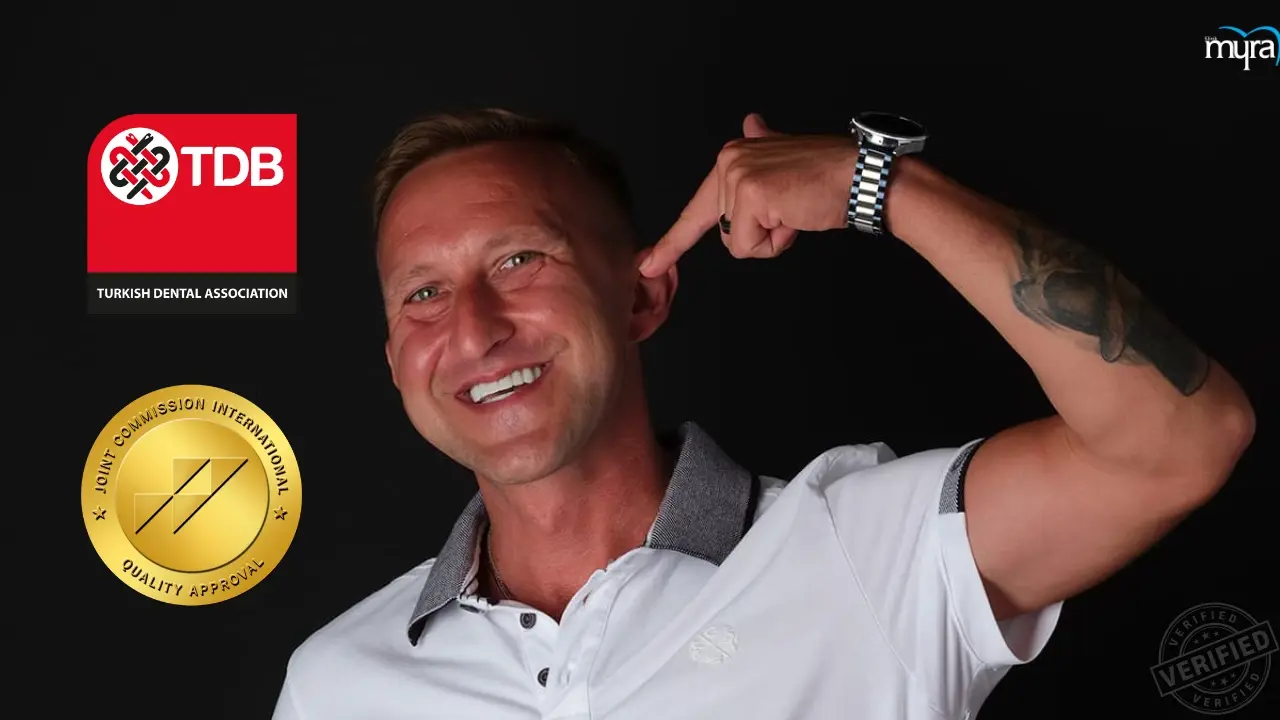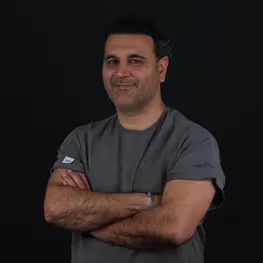Dentists in Turkey are trained medical professionals catering to various dental works like dental implants, veneers, crowns, and bridges. Turkey Teeth is a term that gained prominence due to the country’s reputation for delivering high-quality dental care at considerably reduced costs than in Western countries.
“Turkey Teeth” is a trendy craze in dental tourism, where patients fly to Turkey for inexpensive cosmetic and restorative dental operations to achieve a perfect smile. The procedures entail veneers, crowns, implants, and full smile makeovers. There are risks associated with completing a "Hollywood smile," such as over-preparation of natural teeth, lack of informed consent, and inadequate follow-up after returning home.
Turkish Teeth draws thousands of patients annually because it combines cost-efficiency, skilled dentists, and advanced technology, making it a leading choice for dental transformations.
Turkey Teeth offers several advantages, including slower costs, up to 70-90% savings compared to Western countries, high-quality dental care provided by trained dentists, and the ability to combine treatment with a vacation. Advanced technology and comprehensive dental Turkey packages enhance the experience for international patients. However, disadvantages include risks such as over-preparation of natural teeth, potential complications due to limited aftercare, language, and cultural barriers, and inconsistent quality standards among clinics. These factors highlight the need for thorough research and careful consideration before opting for dental treatments in Turkey.
Choosing a dental clinic Turkey necessitates careful consideration of numerous things to provide a safe and enjoyable experience. Investigating the clinic's reputation is critical by looking up internet reviews, testimonials, and prior patient ratings. Verifying the credentials and skills of dentists in Turkey, including their qualifications and certifications, is crucial.
Clinics that use cutting-edge medical technologies and adhere to international cleanliness and safety standards further guarantee high-quality care. Checking for certification from reputable dental organizations helps to establish the clinic's trustworthiness. Patients must consider the treatment alternatives available, ensure they meet their individual needs, and question aftercare services and warranties.
Direct communication with the clinic determines professionalism, responsiveness, and clarity about fees and services. The clinic's location, close lodgings, and accessibility make for a convenient and stress-free encounter.

Why Choose Turkey for Dental Treatment?
Choose Turkey for dental treatment because of its affordability, first-rate dental care, and cutting-edge technology. Turkey has become a premier destination for dental treatment, offering a compelling combination of affordability, advanced medical technology, and skilled professionals.
The country’s dental clinics provide high-quality services at a fraction of the cost compared to many countries in the West, making it an ideal choice for patients opting for budget-friendly care without compromising on excellence.
Turkish dentists are trained, using state-of-the-art equipment to deliver several treatments, from dental implants and veneers to gum contouring and tooth extractions. These advanced procedures ensure the resolution of dental issues and improve aesthetics and oral health. Turkey offers an exceptional experience combining dental treatment, travel, and exceptional care.
Patients discover the country’s rich cultural heritage, breathtaking landscapes, and vibrant cities while undergoing their procedures, creating a holistic experience that balances health, relaxation, and tourism. Clinics like Myradental further boost the appeal by offering specialized, patient-focused services, ensuring comfort and satisfaction throughout the treatment journey. Turkey stands out as a premier destination for dental care with its combination of cost-effectiveness, cutting-edge technology, and touristic appeal.
The beauty of Turkey has been highlighted by the rise of dental tourism in the country. Patients spend their holidays in the country to get their dental issues fixed while enjoying the gorgeous landscape of such a beautiful country. "Turkey is a top choice for dental treatment due to its affordability, high-quality care, advanced technology, comprehensive packages, shorter waiting times, and the opportunity to combine treatment with tourism."
What are the Advantages of Getting New Teeth in Turkey?
The advantages of getting new teeth in Turkey are listed below.
- Cost-effective: Lower operational expenses, good foreign exchange rates, and efficient healthcare systems contribute to Turkey’s affordability of dental services.
- Tourism Opportunities: Turkey is distinguished by its vibrant culture, magnificent landscapes, and rich historical heritage, in addition to its advanced dental services and affordability.
- Experienced Dentists: Turkish dentists have years of expertise performing a wide range of dental procedures, including advanced cosmetic and restorative treatments, and are familiar with the most recent techniques and technologies in the area.
- High-quality Dental Care: One of the best things about getting dental work done in Turkey is that the clinics there are equipped with cutting-edge medical technology and managed by highly skilled Turkish dentists trained in other countries.
- Wide Range of Services: Clinics frequently offer comprehensive care, encompassing consultations, diagnostics, advanced procedures such as veneers and implants, and post-treatment follow-ups.
- Comprehensive Packages: These all-inclusive packages streamline dental care in a foreign country and enable patients to concentrate on recuperation while experiencing Turkey's cultural and scenic attractions.
- Shorter Waiting Times: Flexible scheduling options, such as weekend and evening appointments, are frequently available at Turkey's clinics, enabling patients to coordinate their treatment with their obligations.
- State-of-the-art Clinics: Laser dentistry and minimally invasive procedures are among the innovative techniques that numerous clinics employ to improve the efficacy and comfort of their treatments.
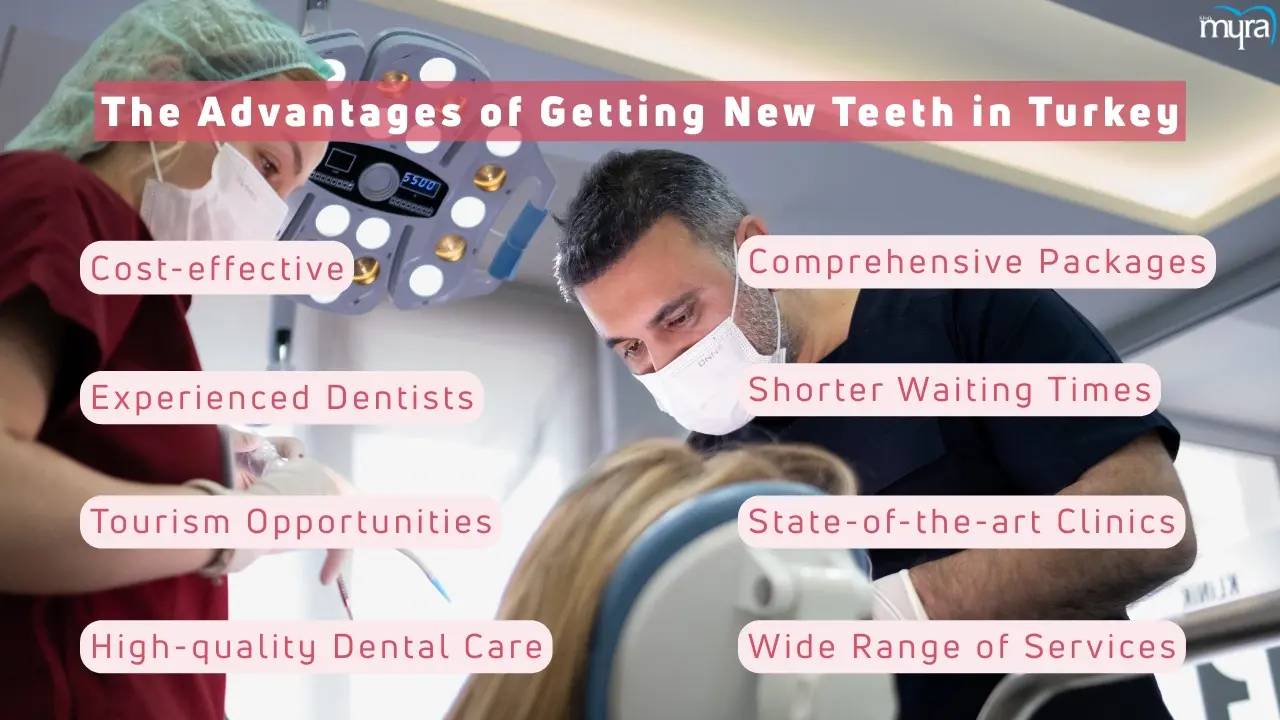
1. Cost-effective
Cost effective dental services sets Turkey apart as a desirable travel destination. Turkey's dental treatment costs are significantly lower than many Western countries, offering patients a compelling economic advantage. The affordability is attributed to lower operational expenses, favorable currency exchange rates, and efficient healthcare systems. Clinics in Turkey maintain high standards of care, combining quality with affordability despite the reduced costs. Patients access advanced dental technologies, namely implants, crowns, and veneers, at a fraction of the price they pay in countries like the UK, USA, or Germany. Dental clinics offer comprehensive packages that include accommodation, airport transfers, and local transportation, further enhancing the value for international patients. Cost-effectiveness and high-quality care make Turkey an attractive destination for travelers hoping to save money without compromising their dental health and aesthetic goals.
2. Tourism Opportunities
Tourism opportunities combined with world-class dental care and an unforgettable cultural experience, make Turkey an attractive destination for patients seeking treatment. The country is renowned for its rich historical heritage, breathtaking landscapes, and vibrant culture beyond its affordability and advanced dental services. Patients undergoing dental procedures in Turkey transform their treatment journey into a memorable holiday, exploring iconic landmarks such as the Hagia Sophia, Cappadocia's fairy chimneys, or the turquoise waters of the Aegean and Mediterranean coasts. The dual-purpose travel enhances the experience and provides a relaxing backdrop for recovery, allowing patients to unwind and enjoy the beauty and diversity of Turkish attractions between treatment sessions. Patients integrate their dental journey with cultural enrichment, making the process productive and enjoyable, from indulging in traditional Turkish cuisine to shopping at bustling bazaars or experiencing soothing hammams. The unique blend of healthcare and tourism offers a holistic approach to healing, turning the treatment period into an enriching and restorative adventure.
3. Experienced Dentists in Turkey
Experienced dentists in Turkey perform various dental procedures in Turkey using modern technologies. Turkey is home to a skilled and internationally recognized pool of dentists, many of whom have extensive training and certifications from prestigious institutions worldwide. These experienced professionals bring expertise to their practice, ensuring patients receive top-tier care tailored to their needs. Turkish dentists have years of experience performing various dental procedures, including advanced cosmetic and restorative treatments. Their commitment to maintaining global standards of care and safety reassures patients, allowing them to trust these experts confidently. Clinics employ multilingual staff, ensuring clear communication and personalized treatment planning. The blend of professionalism, expertise, and patient-centered care guarantees successful outcomes and a positive experience for individuals seeking high-quality dental solutions in Turkey.
4. High-quality Dental Care
High-quality dental care is a key advantage of seeking dental treatments in Turkey, as the country's clinics are equipped with state-of-the-art medical technologies and staffed by highly skilled and internationally trained dentists in Turkey. These professionals bring extensive experience in advanced procedures, ensuring patients receive safe, effective, and aesthetically pleasing results. Clinics adhere to global standards and utilize premium materials for treatments, such as dental implants, veneers, and crowns, which enhance both durability and patient satisfaction. Focusing on precision, hygiene, and patient-centered care ensures that treatments are affordable and meet or exceed expectations. Turkey is a leading destination for reliable and high-quality dental care due to the combination of expertise and advanced technology.
5. Wide Range Of Services
A wide range of services is a significant perk of getting new teeth in Turkey, as the country is renowned for its comprehensive dental treatment options. Clinics provide end-to-end care, including consultations, diagnostics, advanced procedures like implants and veneers, and post-treatment follow-ups. It ensures that patients address all their dental needs in one location without the inconvenience of seeking multiple providers. The availability of modern equipment and skilled professionals further enhances the quality and variety of services, while the competitive pricing compared to other countries makes it accessible to a broader audience.
6. Comprehensive Packages
Comprehensive packages offered by dental clinics in Turkey are a selling point for patients seeking dental treatments abroad. These packages are designed to provide a smooth and hassle-free experience, combining high-quality dental care with logistical convenience. They comprise initial consultations, X-rays, and a personalized treatment plan tailored to the patient's needs. They cover accommodations in reputable hotels and organize transfers between airports, hotels, and clinics, ensuring smooth transitions during the stay. Post-treatment care is another critical component, with follow-up visits and aftercare instructions included to ensure successful outcomes. These all-inclusive offerings simplify the process of receiving dental care in a foreign country and allow patients to focus on their recovery while enjoying Turkey's cultural and scenic attractions. The integration of care and convenience makes Turkey a highly appealing destination for dental tourism.
7. Shorter Waiting Times
Shorter waiting times are convenient for patients seeking dental treatments in Turkey for patients requiring immediate care or aiming to fit procedures into a tight schedule. Long queues and extended booking periods delay necessary treatments by weeks or months for cosmetic or elective dental procedures in many Western countries. Turkey's robust dental tourism infrastructure prioritizes swift service for international patients, with clinics capable of arranging consultations, treatments, and follow-ups within days. The efficiency is achieved through the availability of advanced technology, highly skilled dentists in Turkey, and streamlined scheduling systems that cater specifically to overseas patients. Turkey's clinics offer flexible scheduling options, including evening and weekend appointments, making it convenient for patients to plan their treatment around personal commitments. The expedited timeline allows quicker recovery and the possibility of combining dental care with leisure activities during their stay, making the entire process seamless and efficient for patients traveling from abroad.
8. State-of-the-art Clinics
Dental clinics in Turkey are equipped with state-of-the-art medical technologies, reflecting a commitment to excellence in patient care and treatment outcomes. These modern advancements include cutting-edge diagnostic tools such as digital imaging and 3D dental scanners, which enable precise planning and execution of procedures. High-tech equipment, including CAD/CAM systems, ensures the creation of custom-fit restorations with exceptional accuracy and aesthetic appeal. Clinics incorporate innovative techniques like laser dentistry and minimally invasive procedures, enhancing treatments' effectiveness and comfort. Integrating these advanced technologies streamlines the treatment process, reduces recovery times, and improves patient satisfaction. Turkish dental care has solidified its reputation as a global destination for high-quality treatments by leveraging the latest medical innovations.
What are the Disadvantages of Getting New Teeth in Turkey
The disadvantages of getting new teeth in Turkey are listed below.
- Language Barriers: The patient must understand the process, the materials being used, and any possible consequences or problems if they and the dentist communicate well.
- Cultural and Communication Differences: Healthcare delivery, cultural standards, patient autonomy expectations, and approaches to clarifying medical concepts differ from how patients are used to in their native countries.
- Follow-up Care Difficulties: Inadequate aftercare planning or lack of contact with the initial dentist in Turkey makes it difficult for patients to address issues like infections, discomfort, or poorly fitting dental treatment when they return home.
- Legal and Regulatory Differences: Clinics overseas in Turkey aren't always obligated to adhere to the same governmental regulatory norms as their counterparts in other nations.
- Limited Access to Warranty or Aftercare: Minor difficulties evolve into serious consequences if patients do not have constant access to the clinic and its personnel, weakening the procedure's investment.
- Potential Health Risks from Long Flights Post-treatment: International clinics discharge patients shortly after treatments, risking health and safety. The hasty approach limits monitoring and post-operative care, increasing the risk of problems.
- Travel-related Challenges: Taking the trip entails an expenditure of time and money, which adds to the total cost of therapy.
1. Language Barriers
Language barriers are among the disadvantages of getting new teeth in Turkey. Complex and technical discussions regarding treatment alternatives, risks, and aftercare are challenging for patients seeking dental procedures in Turkey due to language barriers. Effective communication between the patient and the dentist in Turkey is crucial to guarantee that the patient comprehends the procedure, the materials employed, and the potential complications or outcomes. Miscommunication results in misunderstandings regarding the type of treatment being administered, such as the discrepancy between veneers and crowns, which have long-term consequences for the patient's oral health. Language barriers impede a patient's capacity to communicate specific concerns, ask detailed inquiries, or provide medical histories, such as allergies or past dental issues, all essential for a safer and more effective procedure.
Limited communication complicates obtaining clarification or follow-up support from the clinic during post-treatment complications when written instructions or remote consultations are unavailable in the patient's native language. The quality and consistency of specific clinics' translation services or English-speaking staff fluctuate, causing patients to feel isolated and unconfident when seeking medical treatment. Thorough research must address such a challenge and guarantee that a clinic maintains professional, transparent communication throughout treatment.
2. Cultural and Communication Differences
The experience and comprehension of the procedure are significantly impacted by cultural and communication differences for individuals seeking dental remedies in Turkey. Cultural norms in healthcare delivery, expectations regarding patient autonomy, and methods of elucidating medical concepts differ from practices that patients are accustomed to in their native countries. The consultation process needs to be more detailed and structured in certain clinics, which confuses the nature of the procedures, potential risks, and treatment options. For instance, a patient anticipates a collaborative discourse regarding the advantages and disadvantages of different materials or methodologies; however, certain clinics adopt a directive approach that results in unresolved inquiries.
Communication differences entail varying expectations regarding follow-up care, timelines, payment processes, and language barriers. Advocating for a patient's preferences is difficult if non-verbal cues and etiquette, such as conveying dissatisfaction or requesting changes to a proposed treatment plan, do not align with their cultural norms. These disparities lead to misunderstandings, diminished trust in the provider, and even suboptimal outcomes if patients need to be adequately informed or are hesitant to seek clarification. Discrepancies must be resolved by choosing a clinic that provides high-quality care and employs multilingual staff dedicated to bridging cultural and communication gaps.
3. Follow-up Care Difficulties
Follow-up care is a significant challenge for patients undergoing dental procedures in Turkey, such as veneers or crowns, due to the geographical distance and lack of continuity in treatment. Patients return home without adequate aftercare plans or access to the original dentist, making it difficult to address complications like infections, pain, or ill-fitting dental work. Local dentists in the UK need help assessing the work done abroad, as records of materials used and treatment details are unavailable. Corrective procedures are costly and time-consuming, negating the initial savings of traveling for cheaper treatment. The lack of follow-up care highlights the risks of seeking cosmetic dentistry abroad without proper support systems.
4. Legal and Regulatory Differences
Legal and regulatory differences… Clinics abroad, including ones in Turkey, are not always required to meet the same government regulatory standards as clinics in other countries. Regulated clinics adhere to strict guidelines regarding hygiene, insurance, and safety. Opting for treatment in an unregulated clinic poses significant risks to health and safety, as these establishments do not follow professional standards. Patients undergoing dental procedures, such as Turkey Teeth, in unregulated clinics report experiencing severe oral issues upon returning home, including infections and tooth loss. It results in additional financial burdens for corrective treatments, highlighting the dangers of clinics not being held to specific regulatory requirements.
5. Limited Access to Warranty or Aftercare
Limited access to warranty or aftercare.. Aftercare plays an essential role in the success and longevity of any dental procedure, serving as a cornerstone for recovery and optimal outcomes. Its importance becomes even more pronounced when treatment is conducted abroad, as the ability to revisit the original clinic for follow-ups is often limited. Aftercare is not just a complementary aspect of treatment, and it is integral to ensuring proper recovery, addressing complications, and maintaining the desired outcomes over time. The necessity becomes even more pronounced when dental procedures are performed abroad, as logistical barriers often limit patients' ability to return to the original clinic for follow-ups. Minor issues escalate into significant complications, undermining the investment made in the procedure without consistent access to the clinic and its professionals. Comprehensive aftercare is essential to monitor progress, provide timely interventions, and uphold the quality of results, underscoring its irreplaceable role in dental treatments, especially for patients seeking care internationally.
6. Potential Health Risks from Long Flights Post-treatment
Potential health risk from long flights post-treatments… Dental procedures like Turkey Teeth are completed abroad on rushed timelines, leaving patients with minimal recovery options. Clinics abroad discharge patients immediately after the procedure, posing risks to health and safety. Suppose follow-up treatment becomes necessary upon returning to the UK. Local dental teams have difficulty assessing the work performed abroad without detailed records about the materials used or specific treatment plans. Receiving all treatment within a single, trusted dental practice ensures consistency and comprehensive care.
8. Travel-related Challenges
Travel-related challenges are inevitable in unfamiliar places. Travel considerations for dental procedures in Turkey extend beyond just booking flights and accommodations. The journey requires time and financial investment, adding to the cost of treatment. Potential travel-related risks, such as flight delays, cancellations, or unforeseen health issues, complicate the process. These disruptions impact the treatment schedule, prolong recovery, or incur additional expenses. Travelers must navigate language barriers, cultural differences, and unfamiliar healthcare systems, which add stress to an already demanding experience. Proper planning and contingency measures are crucial to mitigate these risks and ensure a smoother journey.
What is Turkey Teeth?
Turkey teeth refers to a trend in dental tourism where individuals travel to Turkey for dental treatments, often cosmetic, that are significantly less expensive than similar procedures in the UK. The term gained popularity following media coverage of celebrities and influencers, such as Love Island winner Jack Fincham, who showcased their "Hollywood smiles" after dental work in Turkey. It has advantages and disadvantages, but the trend promises a dazzling smile at a fraction of UK costs. “Turkey Teeth refers to cosmetic dental treatments, such as veneers, crowns, or full-mouth restorations, performed in Turkey. It is popular due to its affordability, high-quality care, advanced technology, and the opportunity to combine dental treatment with tourism.”
The primary appeal of Turkey Teeth lies in its affordability, with costs claimed to be up to 70% lower than private dental care in the UK. Clinics in Turkey offer "all-inclusive" packages that bundle treatments with accommodation and travel, creating the convenience of a dental holiday. Marketing campaigns emphasize access to advanced technology, skilled dentists in Turkey, and the opportunity to combine treatment with a vacation. The difficulty in accessing NHS dental care has led patients to seek routine care overseas, regardless of the difficulties in accessing NHS dental services. 90% of NHS dental practices reportedly do not accept new adult patients.
The treatment includes dental crowns rather than veneers, an important distinction. Crowns necessitate substantial filing down of the normal teeth, leaving merely stubs underneath. Veneers are chosen for strictly cosmetic reasons because they preserve more of the natural tooth structure, while crowns are commonly used in the UK to repair badly damaged teeth. Crowns are less expensive than veneers, contributing to Turkey's lower pricing. Crowns last up to 15 years but must be replaced when they fail, incurring long-term costs.
The Turkey Teeth trend is subject to criticism due to its potential risks and drawbacks despite its widespread popularity. These consist of brief consultation periods, remote assessments (frequently conducted via social media or phone), and expedited treatment times, compromising quality. Turkey Teeth is associated with potential risks that require meticulous research and careful consideration, although the trend provides an affordable alternative to attaining a "Hollywood smile." Prospective patients must verify the credentials of their preferred clinics, obtain comprehensive consultations, and evaluate the long-term implications of their treatment options.
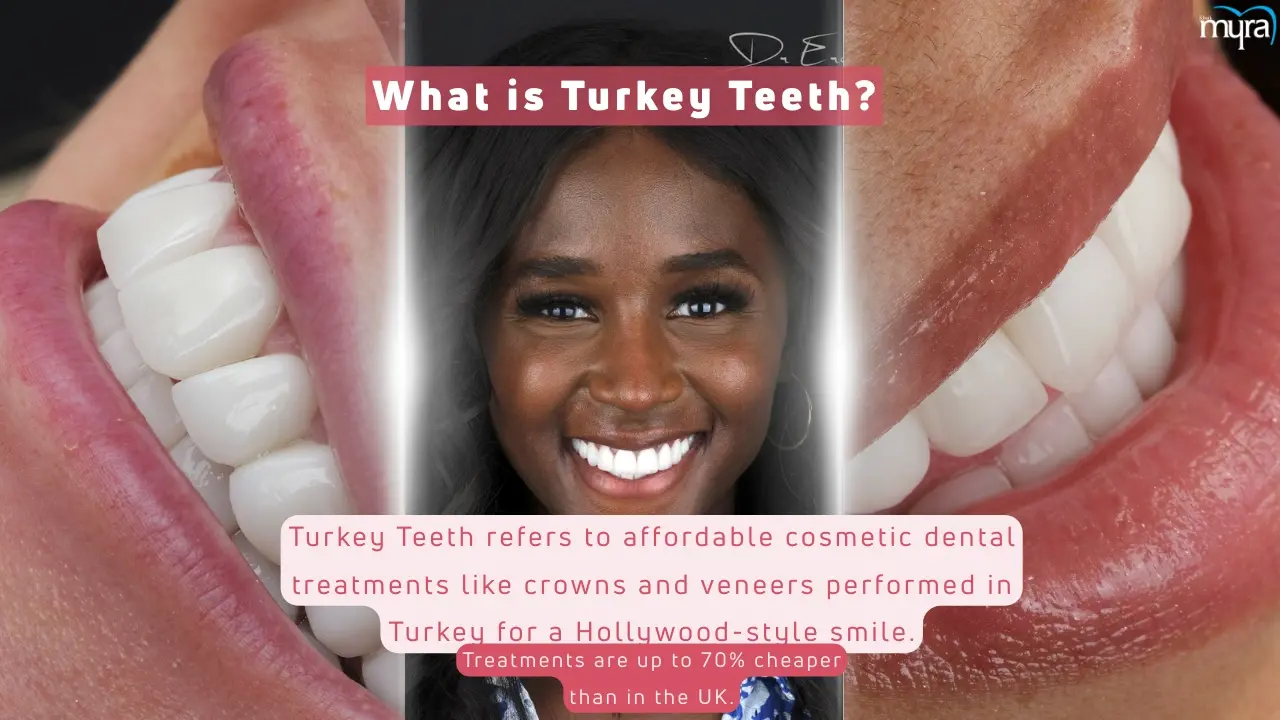
What are the Different Dental Treatments in Turkey?
The different dental treatments in Turkey include dental implants, dental veneers, dental crowns, dental bridges, and smile makeovers.
A dental implant treatment involves replacing missing teeth by surgically placing an artificial tooth root made of titanium or another biocompatible material into the jawbone. The titanium implant integrates with the bone, providing a stable foundation for supporting replacement teeth, such as crowns or bridges. Dental implants are designed to mimic the natural structure of teeth, ensuring a durable and aesthetically pleasing solution for gaps or damaged teeth. The procedure is ideal for patients struggling with dentures or missing teeth, as it prevents bone loss and helps preserve facial structure. The process requires two visits to the dental clinic.
The implant is surgically placed during the first visit, and a healing period of at least three months is observed to allow the implant to integrate with the jawbone. Temporary crowns or bridges are provided during such times to maintain functionality and appearance. Permanent crowns or bridges are affixed on the second visit, completing the restoration.
High-quality implants in Turkey, like treatments offered in Turkey, are manufactured from 100% Grade 4 or 5 titanium, ensuring compatibility, durability, and a lifetime guarantee. Dental implant clinics in Turkey, particularly Antalya, Fethiye, Istanbul, and Marmaris, utilize advanced technology, including 3D tomography and guided surgery, for precise placement and optimal outcomes. These clinics offer comprehensive and cost-effective solutions, providing leading implant brands such as Straumann and Nobel Biocare, ensuring quality and longevity for patients seeking a transformative dental experience.
Dental crown treatment involves covering and protecting damaged, broken, or worn-down teeth with a full-coverage restoration that encases the tooth entirely, ensuring aesthetic and functional improvements. Crowns, often considered full veneers, are custom-made to mimic the natural appearance of teeth in terms of color, shape, and size, blending seamlessly with surrounding teeth.
They provide a durable solution for restoring teeth compromised by decay, fractures, or cosmetic imperfections. Dental crowns are used to improve the appearance of a smile, addressing issues like gaps, abnormal tooth shapes, and significant wear. They are part of smile makeovers or dental facelifts, enhancing the facial structure and rejuvenating the appearance of cheeks and lips.
There are two common types of dental crowns, the Metal Porcelain (PFM) and the Zirconium Porcelain. Metal Porcelain crowns combine a strong metal core with a porcelain overlay, offering durability and a natural appearance. However, they reveal a black line at the gum line if gums recede over time. Zirconium Porcelain crowns, made from zirconium dioxide, provide enhanced aesthetics with a permanent white core, ensuring no visible dark line even with gum recession.
Crowns in Turkey are suitable for front teeth due to their natural transparency and biocompatibility. The treatment spans 3 to 5 days and is performed in specialized clinics with advanced dental technologies. Turkish clinics in Antalya, Fethiye, Istanbul, and Marmaris craft crowns using high-grade materials in renowned laboratories, ensuring precision, durability, and exceptional aesthetic results.
Dental veneers are thin, custom-made restorations composed of porcelain or ceramic materials designed to cover the front surface of teeth and improve their appearance. Veneers are an excellent choice for treating cosmetic issues, including discolouration, small gaps, minor chipping, and slightly uneven or malformed teeth.
Laminate veneers are a popular cosmetic dental surgery in Turkey, due to innovative dental technology and trained technicians at VIP dentistry centres. These veneers enhance the aesthetics of a smile, and they have a natural, translucent appearance that mimics the texture and color of genuine enamel.
Premium choices like E.max© Laminate Veneers and Celtra®️ Duo Veneers are made with high-quality materials that are strong, durable, and visually appealing. E.max© veneers, constructed from lithium ceramic, are exceptionally robust and resistant to cracks. Celtra®️ Duo veneers, made of zirconia-reinforced lithium silicate, give superb translucency and light conductivity for a lifelike appearance.
These veneers are precisely designed and produced in on-site facilities, allowing for precise personalization based on the patient's specifications. Patients participate in the design process utilizing CAD/CAM technology, resulting in a custom grin that complements their facial traits.
Dental veneer treatment in Turkey is well-known for combining economy and high quality, with clinics using cutting-edge technology, competent cosmetic dentists, and talented technicians to achieve excellent results. The treatment normally lasts 1 to 5 days and tailored to address single-tooth restorations or whole smile makeovers, leaving patients with a long-lasting, beautiful smile.
A dental bridge treatment is a fixed dental solution to restore one or more missing teeth by spanning the space between adjacent teeth. It entails securing a prosthetic tooth or teeth to the natural teeth or dental implants on either side of the gap, known as abutments. The teeth on both sides are prepared to support the bridge, which is fixed in place for a non-removable, long-lasting solution.
The bridge is made of high-quality materials such as metal porcelain (PFM) or zirconium porcelain to give it a natural appearance and provide complete functionality for chewing and speaking. Each bridge is designed to fit smoothly into the patient's mouth, with crowns linked together to seem like individual teeth, ensuring a natural appearance.
The number of missing teeth determines the size of the bridge, which requires extra crowns at each end to securely anchor the structure. For example, a single lost tooth necessitates a three-unit bridge, whereas two missing teeth necessitate a four-unit bridge.
Advanced CAD/CAM technology enables the exact and efficient construction of bridges, frequently right in the clinic's on-site laboratory, saving time and money. The approach provides high-quality craftsmanship by combining the knowledge of cosmetic dentists and trained dental technicians to produce a practical and visually appealing product.
Dental bridges are an efficient alternative to removable dentures, providing a fixed solution that restores the appearance of a smile and the confidence to eat and speak. Turkish clinics specialize in developing these high-quality restorations with dental bridges in Turkey, combining innovative technology with great craftsmanship to produce outstanding results for patients looking for a cost-effective and dependable dental treatment.
A smile makeover treatment is a cosmetic dental procedure designed to enhance the appearance of a smile by addressing various aesthetic concerns such as discolored, chipped, gapped, uneven, or misshapen teeth. The process involves using custom-made restorations, including dental crowns and laminate veneers tailored to improve the teeth' shape, size, and color.
The treatment creates a more symmetrical and visually appealing smile, often transforming the overall facial aesthetic by strategically placing these restorations. A smile makeover in Turkey is about correcting flaws and creating a lasting impression, as the smile plays a vital role in conveying confidence and personality. The procedure is carefully planned to ensure that the results align with the patient’s desired look while enhancing the natural beauty of their teeth.
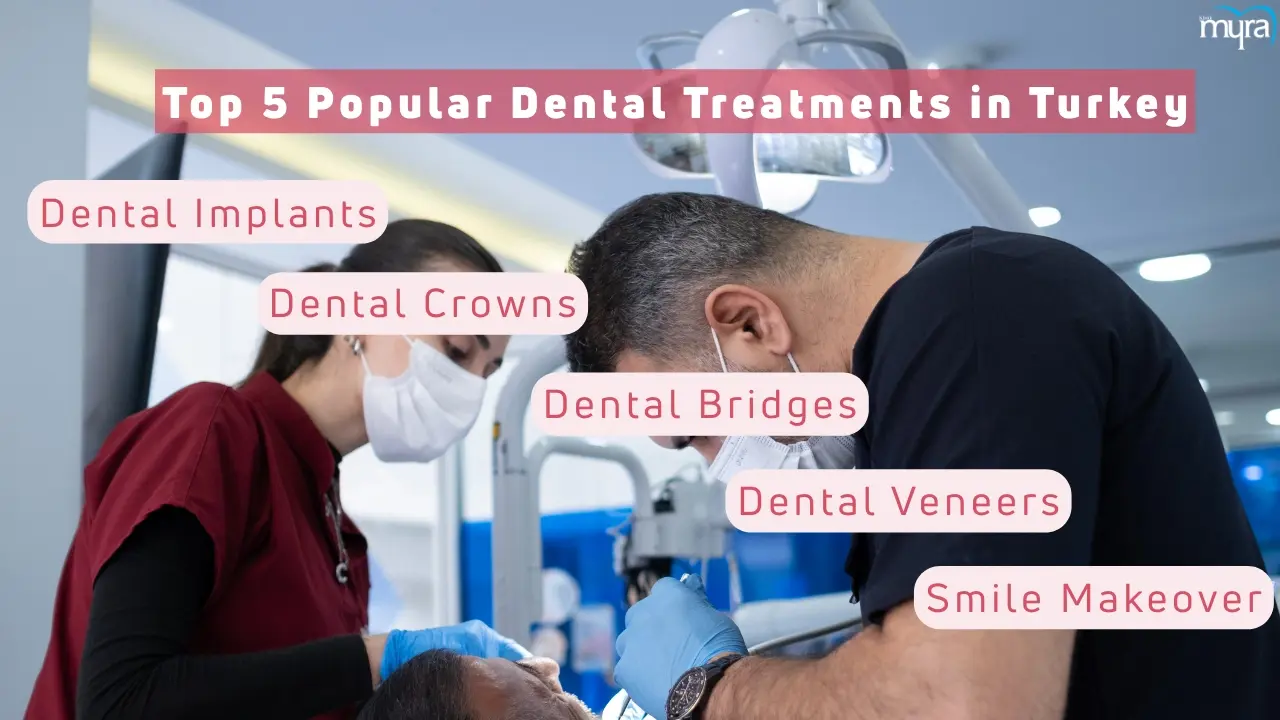
What is the Cost of Dental Treatment in Turkey?
The cost of dental treatment in Turkey is very affordable. Dental treatment in Turkey is exceptionally affordable, ranging from €460 for a titanium dental implant, including the abutment and crown, to €3,200 for full-mouth restoration options like all-on-4 implants. Cosmetic treatments are similarly cost-effective, with porcelain crowns priced at €130 and zirconia crowns at €145. Basic dental procedures such as tooth extractions cost around €45, while anterior root canal treatments are available for €68.
These competitive prices and the high standards of Turkish dental clinics, including advanced technology and internationally trained dentists, make Turkey an attractive destination for dental tourism. The lower cost of dental treatment in Turkey makes it popular for patients looking for reasonably priced dental services with the same quality offered by other European nations.
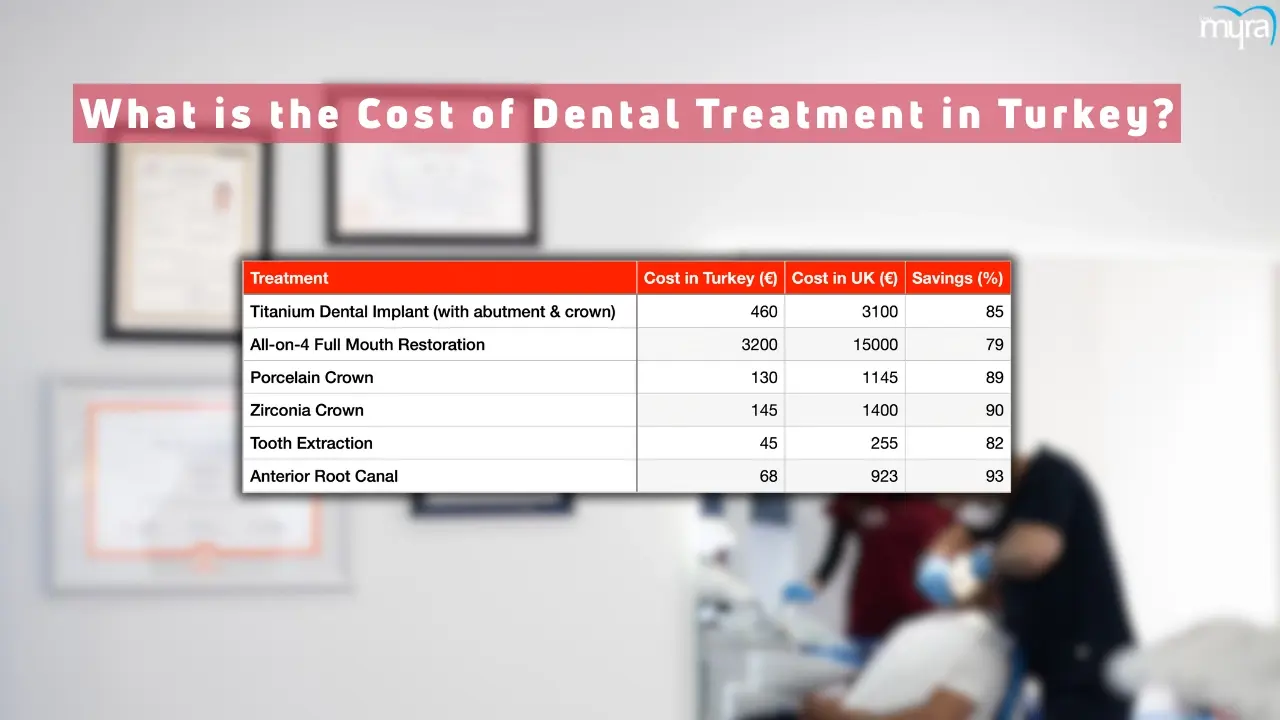
Is Dental Treatment much cheaper in Turkey compared to the UK?
Yes, dental treatment is much cheaper in Turkey clinics compared to the UK clinics. The cost of dental treatment in Turkey is considerably lower than that in the United Kingdom, with savings ranging from 70% to 90% on various procedures. For instance, the cost of a titanium dental implant in Istanbul, which includes the abutment and crown, is approximately €460. The average cost of the same procedure in the United Kingdom is €3,100, resulting in an 85% savings. The expense of full-mouth restoration options in Istanbul, such as all-on-4 implants, is approximately €3,200, 78% less than the UK's cost of €15,000.
Cosmetic treatments such as porcelain crowns, priced at €1,145 in the UK, are available in Istanbul for only €130, resulting in an 88% reduction. Zirconia crowns are priced at €145 in Turkey, compared to €1,400 in the UK, resulting in an 89% savings. Basic procedures such as extractions and root canal treatments are more affordable in Turkey. For example, extractions are priced at €45 in Turkey, while they cost €255 in the UK. Anterior root canals are priced at €68, with a difference of €855. Dental clinics in Turkey maintain their high standards by employing competent Turkish dentists with international training, ISO certifications, and advanced technology despite its affordability. Turkey is a highly appealing destination for dental tourism from the United Kingdom due to its affordability and quality guarantee.
Dental implant clinics in the UK and Turkey differ not only in cost but also in treatment approach, operational models, and patient experience. While UK clinics often follow a more traditional and time-extended treatment pathway, Turkish clinics—especially those catering to international patients—prioritize efficiency, offering comprehensive treatment plans within shorter timeframes. Turkish clinics are well-equipped with advanced technologies such as CAD/CAM systems, digital smile design software, and 3D imaging, enabling precise diagnostics and faster restorations. Many Turkish dentists have international certifications and experience, and clinics are ISO-accredited, ensuring global standards of hygiene and care. Moreover, Turkish dental centres often operate within a medical tourism framework, offering all-inclusive packages that combine high-quality dental work with travel and accommodation services. This integrated approach, alongside significant cost advantages, makes Turkey a highly attractive alternative to the UK for dental implant procedures.
Is Dental Treatment much cheaper in Turkey compared to the US?
Yes, dental treatment is much cheaper in Turkey compared to the US. Dental treatment in Turkey is more affordable than in the United States, offering savings of up to 70-90% on a wide range of procedures. For instance, a titanium dental implant in Turkey costs approximately $500, including the abutment and crown, compared to $4,500 in the US, providing an 88% cost reduction. Full-mouth restoration procedures like all-on-4 implants are available for as low as $3,500 in Istanbul, whereas the exact treatment costs around $24,000 in the US, representing an 85% saving.
Cosmetic procedures like porcelain crowns and veneers, which cost $1,800 and $2,500 respectively in the US, are priced at just $140 and $170 in Turkey, offering over 90% savings. Basic treatments such as root canals and teeth whitening are available at drastically reduced rates, costing $75 and $130 in Turkey compared to $1,100 and $1,000 in the US. Turkish dental clinics maintain high standards, employing advanced technology, internationally trained dentists, and rigorous sterilization protocols, ensuring quality care on par with or better than US standards despite the affordability. Cost savings and quality make Turkey, particularly Istanbul, a desirable destination for dental tourists seeking affordable yet practical solutions to their oral health concerns.
While both countries offer qualified professionals and successful outcomes, dental implant clinics in the USA differ from those in Turkey in terms of treatment models, pricing structures, and service delivery. Clinics in the United States often follow a segmented, multi-visit approach spread over months, whereas Turkish clinics are structured to provide fast-track treatments within a shorter timeframe, often in one trip. Turkish clinics also tend to include accommodation, transfers, and personalized care coordination as part of their packages—creating a seamless and stress-free experience for international patients. This patient-centered approach, combined with significant cost advantages, positions Turkey as a practical and compassionate choice for those seeking both affordability and excellence in dental implant care.
How to Choose the Best Dental Clinic in Turkey?
To choose the best dental clinic in Turkey, there are ten steps to follow. First, research the clinic's reputation by reviewing online testimonials, patient reviews, and clinic ratings. Second, verify the dentists' credentials to confirm they are qualified, certified, and experienced in the specific procedures a patient requires. Third, assessed the clinic's technology and facilities to ensure they use modern equipment and maintain a hygienic environment. Fourth, check for accreditation from international dental organizations, which indicates compliance with global standards.
Fifth, review the treatment options to confirm they align with a patient’s dental needs. Sixth, inquire about aftercare services and warranties to ensure patients have access to follow-up care if necessary. Seventh, compare costs by evaluating quotes and checking for hidden fees, ensuring transparency. Eighth, consider the clinic's location, prioritizing patients in accessible areas with nearby accommodations for convenience. Ninth, contact the clinic directly to gauge their responsiveness and professionalism, which reflects their commitment to patient care. Lastly, seek recommendations from trusted sources or online forums for further assurance.
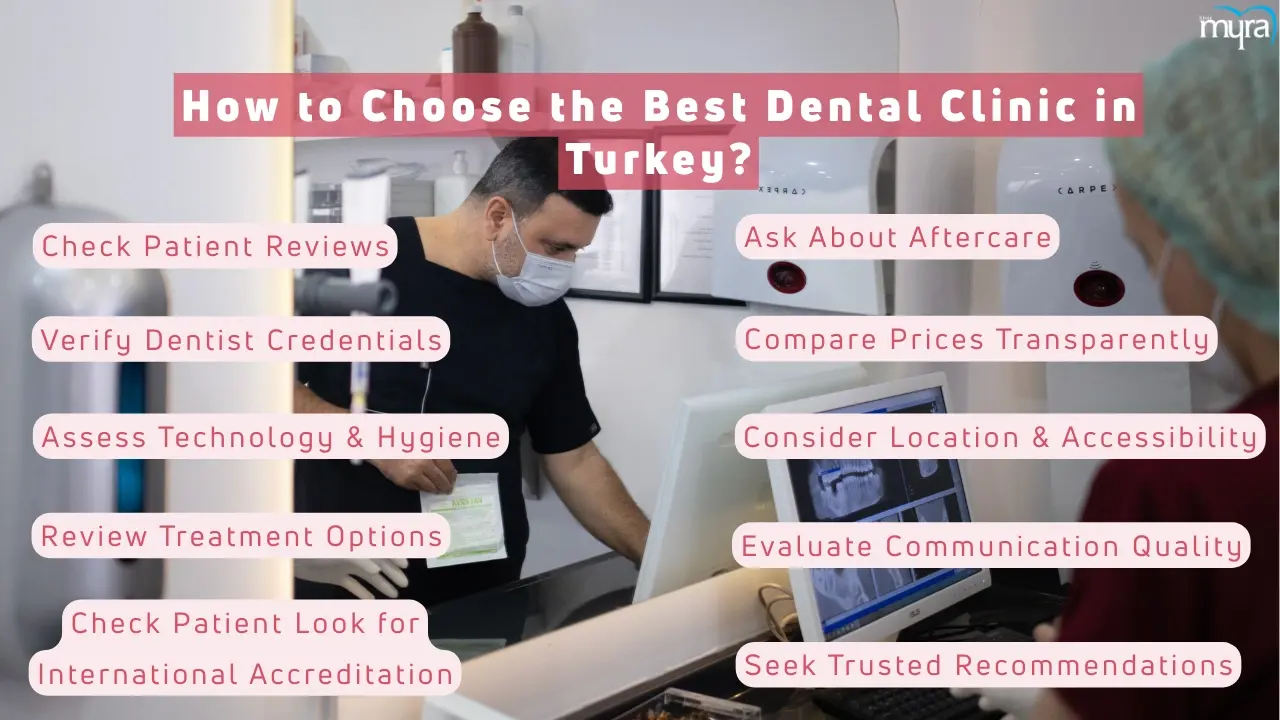
What is the Best Dental Clinic in Turkey?
The best dental clinic in Turkey is Myradental. Myra Dental Centre Turkey stands out as one of the best dental clinics in Turkey due to its combination of advanced technology, exceptional patient care, and comprehensive dental services at competitive prices. The clinic has built a reputation for delivering top-tier dental treatments such as fillings, implants, veneers, bridges, smile design, and whitening in the vibrant city of Antalya.
Myra Dental Centre's commitment to innovation is reflected in its state-of-the-art equipment, including soft tissue lasers, in-clinic CAD/CAM milling machines, digital smile design tools, and 3D volumetric tomography. These tools ensure precision and efficiency in dental procedures. The clinic is staffed by highly skilled dentists and surgeons who are members of the Turkish Dental Association, and their expertise is complemented by their ability to communicate fluently in English, making the experience seamless for international patients.
Transparency is a core value at Myra Dental, with detailed treatment cost estimates provided upfront and no hidden fees, fostering trust among patients. The clinic is renowned for its focus on patient comfort, ensuring a positive experience from consultation to post-treatment care. Testimonials from satisfied patients, including social media influencers who showcase their smile transformations, further highlight the clinic's excellence. Myra Dental Centre Turkey offers world-class dental care and a holistic experience in a city celebrated for its welcoming climate and cultural richness, making it a preferred choice for dental tourism.
What are the Considerations in Choosing Turkey for your Dental Treatment?
The considerations in choosing Turkey for your dental treatment are listed below.
- Survey Reviews of Dental Clinics: Verify the credibility of reviews by checking platforms like Trustpilot, which strictly monitors for fake reviews. Look for detailed testimonials that include specific treatment experiences and video reviews to ensure authenticity. Google Business reviews provide insights, but it is advisable to double-check for reliability.
- Examine Before & After Photographs: Assess a clinic's success through its patient gallery showcasing before-and-after photos. Ensure the images are original by cross-referencing with Google images and checking the clinic's Instagram account for consistency and dates.
- Review Clinic Biography and Accreditation: Confirm the clinic's credibility through its website, ensuring it provides detailed information about dentists and staff qualifications. Clinics must be accredited by the Turkish Dental Association (TDA) and have the necessary medical certifications. Avoid medical tourism agencies posing as clinics without proper dental facilities.
- Assess the Quality of Services and Technology: Choose clinics with advanced technology such as X-rays, 3D tomography, intraoral scanners, and digital smile design tools. A full-service clinic offering comprehensive treatments, routine care, and specialized procedures is ideal. Verify the quality of laboratory setups and materials used for dental treatments.
- Check for Transparent Pricing and Hidden Costs: Beware of offers that seem too good to be true. Ask about hidden fees like temporary teeth, injections, and additional services. Reputable clinics provide treatment warranty terms and use certified materials and technology.
- Compare Costs and Accessibility: Compare the prices of well-known clinics, keeping in mind that high-quality materials and services require a higher investment. Choose clinics in accessible cities like Istanbul or Antalya, where flights are more frequent and affordable.
- Consider Waiting Times: Understand that while Turkey offers shorter waiting times than many Western countries, there is a brief wait before procedures. Opt for boutique clinics prioritizing comfort during waiting periods and managing patient schedules effectively. One of the considerations in choosing Turkey for dental treatment is the waiting time since most patients are tourists, and their time is limited.
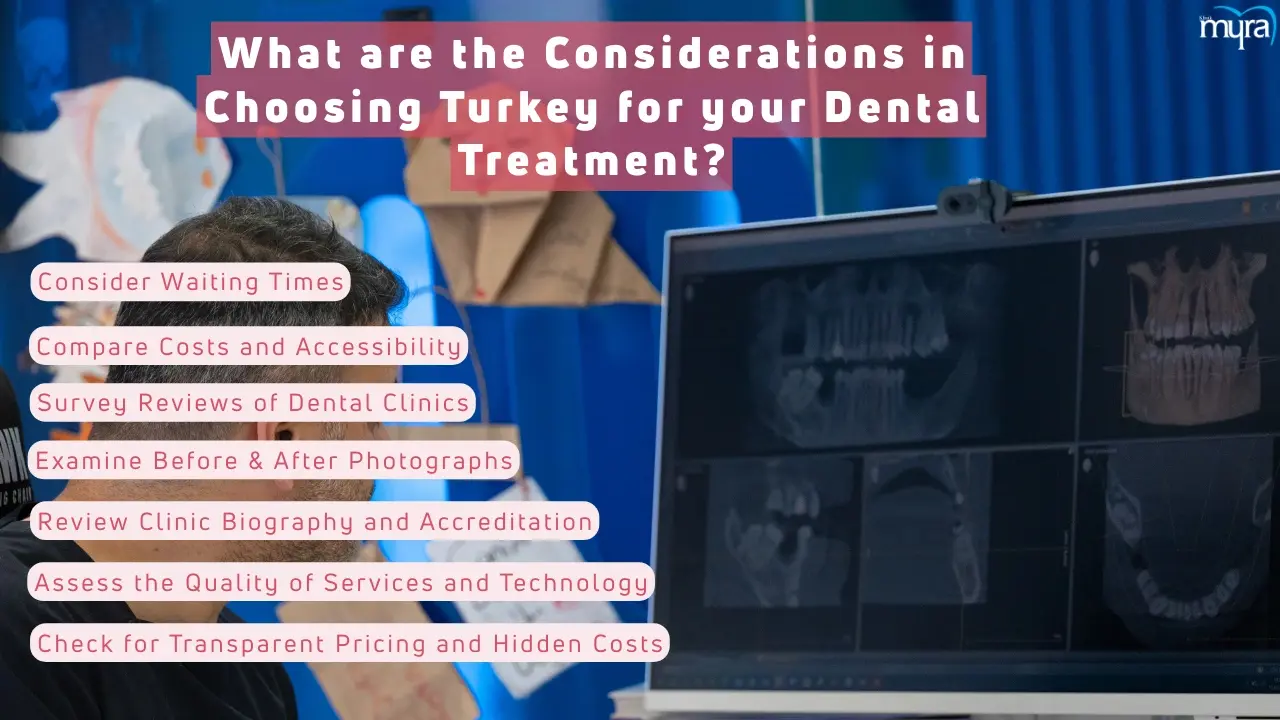
Are Turkish dentist accredited internationally?
Yes, Turkish dentists are accredited internationally. Turkish dentists and dental clinics are accredited internationally, assuring their adherence to high patient safety and quality care standards. Accreditation from internationally recognized bodies such as the Joint Commission International (JCI) is available to dental clinics in Turkey that meet rigorous infection control, patient safety, and operational excellence criteria. JCI accreditation is prestigious in the global healthcare community, indicating that a clinic or practitioner meets or exceeds internationally accepted standards.
Turkish dental clinics and dentists benefit from adhering to international standards set by organizations like the World Health Organization (WHO) and the International Organization for Standardization (ISO), aside from JCI accreditations. These standards establish guidelines for safe practices, effective infection control, and high-quality patient care. Clinics that align with such benchmarks enhance their reputation and competitiveness on a global scale, making them attractive to international patients seeking dental treatments in Turkey.
The Turkish Dental Association (TDA) is crucial in nationally establishing and enforcing dental standards. Adherence to TDA standards aligns with international expectations, while TDA accreditation primarily evaluates practitioners and facilities based on domestic guidelines. For instance, Turkish dentists and clinics must implement strict sterilization, disinfection, and patient safety protocols and ensure their staff has the requisite education and training. These measures mirror the requirements of international accrediting organizations, making Turkish clinics viable candidates for global accreditation.
Turkish dentists and clinics are accredited internationally or adhere to global standards, offering high-quality care that meets the expectations of domestic and international patients. Turkish dental practitioners ensure their services are safe, reliable, and globally recognized by combining national standards from the TDA with international accreditation from bodies like JCI.
